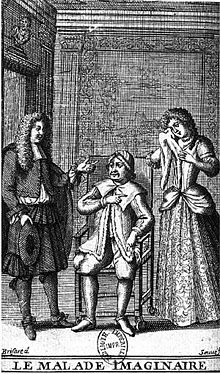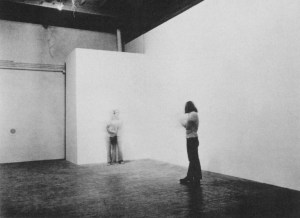Sneha Mantri
One of the best-known literary depictions of hypochondria is Molière’s medical play, Le Malade imaginaire, which is occupied with the struggle for power between Argan, the titular “invalid,” and those who surround him. One reading of Argan focuses on his victimhood, arguing that the character believes so completely in his own illness that he is at the mercy of the shrewd doctors who wait on him. From this critical standpoint, Argan is the “mean, suspicious, and easily gulled hypochondriac” (Brockliss 343) rather than an agent of his own free will. However, this strand of criticism ignores Argan’s power over the other characters in the play. Argan, more than anyone else in the play, is convinced that he is the most important figure in his social circle. Although he is indeed “easily gulled” by his doctors, his daughter, and even his servant, Argan also insists on his own authority and dignity as patriarch of the family, using hypochondria to manipulate others. Throughout the play, he simultaneously subjugates himself and claims his own agency.

The famous opening scene of Le Malade imaginaire is Argan’s monologue as he reads and allots money to pay the bill sent to him by M. Fleurant, his apothecary. Argan has, in the past month, subjected himself to a variety of invasive, humiliating procedures; he notes the numbers of enemas and purgatives just as carefully as he keeps track of the money all this medicine costs him. Argan reveals that he measures his health from month to month against the number of medicines he has taken. Upon discovering that in the current month, he has had “eight medications” and “twelve enemas” instead of the previous month’s “twelve medications and twenty enemas,” Argan exclaims, “I’m not surprised that I don’t feel as well this month as last” (Molière I, i). For Argan, medicine is not a tool for restoring health; rather, health is a nebulous entity that responds best to constant (or constantly increasing) purgation. Rather than submitting to the health/medicine hierarchy dictated by society, Argan creates his own hierarchy, a reversal and perversion of what he “should” believe. From the earliest lines of the play, therefore, Molière demonstrates the potentially subversive nature of hypochondria. Argan simultaneously exerts his agency over his own body, and defers that agency to his physician’s overzealous prescribing habits.
This dual characterization of Argan as victim and agent also affects his relationship with other characters. Unlike most contemporary farces, Le Malade imaginaire is structured like a wheel, with Argan at the hub and everyone else around the rim. In other words, each character is developed primarily through his or her interactions with Argan, rather than through interactions with each other. As a consequence of this unusual structure, the reader or audience of the play learns about Argan’s relationships not via gossip between other characters, but rather through direct observation of those interactions. This stylistic choice allows Molière’s satire to shine, particularly when depicting Argan’s tense relationship with the medical community.
The medical establishment is represented in the play by the Diaforus father-son pair and by M. Purgon, Argan’s personal physician who is also Thomas Diaforus’ uncle; all three are allied against Argan’s interests in order to fleece him. When Diaforus’ diagnosis of splenetic trouble and treatment of roast meats conflict with Purgon’s earlier diagnosis of liver disease and prescription of boiled meats, Diaforus is quick to “protect the profession” (Bermel) by saying “roast, boiled, same thing” (Molière II, vi). Despite Argan’s politeness and even submission to the medical establishment, he is fundamentally on the wrong side of the divide that separates layman from physician. On the surface, the physicians appear to defer to Argan, as he does to them, but they form a closed community against which the patient is powerless.
The hidden antagonism between doctor and patient comes to a head when M. Purgon, angered that Argan has “rebelled against the remedies that I prescribed” (Molière III, v) by seemingly refusing an enema, launches a long and bitter curse against Argan. M. Purgon predicts “an incurable state,” complete with bradypepsia, dyspepsia, apepsia, lientery, dysentery, hydropsy, and finally death. The curse, with its rhyming, imaginary diseases, is ridiculous and comic for the audience, but painfully awe-inspiring for Argan. His cry “I am dead…the medicine is taking its revenge” (Molière III, vi) demonstrates his complete belief in the power of the doctor’s curse, which further undermines the “authority” to which he so desperately clings.
In a final, convoluted effort to retain control over his body and family, Argan agrees to feign his own death. His pretty second wife, Béline, when she hears of his “death,” shouts “Heavens be praised!” (Molière III, xii) and rejoices over her good fortune in being rid of “an inconvenient man.” At last, Argan understands that his hypochondria and subsequent paranoia have misled him. Faced with a broken worldview, he tries to punish her, God-like, but before he can pronounce his sentence, Béline runs off and escapes his wrath. By contrast, Argan’s daughter Angélique weeps inconsolably at the loss of “the only being left me in the world” (Molière III xx); as a reward for her loyalty, Argan finally agrees to allow Angélique to marry her lover Cléante.
Even Argan’s consent to the marriage is bound in his own self-interest: “if he [Cléante] becomes a doctor, I’ll consent to the marriage. Yes, become a doctor, and I’ll give you my daughter” (Molière III xxii). Argan cannot recognize the marriage except on his own terms. Even his brother’s suggestion to “become a doctor yourself” simply plays into Argan’s egoism. Argan balks at this; he wants all the benefits of medical knowledge but none of the challenges of “knowing how to speak Latin, understanding diseases and their cures” (Molière III xxii). Finally, his brother convinces him that “when you put on a doctor’s cap and gown, all that will come of itself.” Once Argan learns that “becoming a doctor” is free and can happen right in his own home, he readily consents both to the farcical medical ceremony and to the marriage between his bourgeois daughter and an impoverished musician. The ceremony, which unifies physician and patient into a single character, completes what Argan believes to be the centralization of power within himself. In becoming a physician while remaining a patient, Argan reduces the inherent hierarchy of a relationship dyad into a single character.
The end of the play has a more sinister interpretation as well. Unlike other comedies of the era, Le Malade imaginaire refuses to fully re-establish the dominant social order and incorporate all the characters into a common purpose. Selfish Béline escapes her comeuppance; the young lovers, though married, are still subject to Argan’s whims; and Argan himself is rewarded with the social capital and authority of “becoming a doctor.” Molière’s satire is sharp: hypochondria is an incurable illness not only for the “patient” but also for the family and society.
Image Credit: La Malade Imaginaire by Pierre Brissart. Retrieved from WikiMedia Commons.
Further Reading
Bermel, Albert. “The Imaginary Invalid.” In Molière’s Theatrical Bounty: A New View of the Plays, 182-95. Southern Illinois University Press, 1990.
Brockliss, Laurence and Colin Jones. The Medical World of Early Modern France. Oxford: Clarendon Press, 1997.
Dandrey, Patrick. Molière et la maladie imaginaire: ou de la mélancolie hypocondriaque. Paris : Editions Klincksieck, 1998.
Lalande, Roxanne Decker. “Le Malade imaginaire: The Symbolic and the Mimetic.” In Intruders in the Play World: The Dynamics of Gender in Molière’s Comedies, 168-85. Madison, N.J.: Fairleigh Dickenson University Press, 1996.
Molière. Le Malade imaginaire. 1673. Ed. Yves Hucher. Paris: Librairie Larousse, no date.

